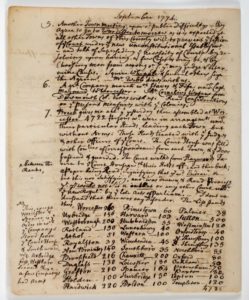Note: The following is the ninth in a series of eleven weekly posts that present my attempt to answer the question, “How does history connect Westborough and India?” See the Introduction for an overview of the series and to start reading it from the beginning.
–Anthony Vaver, Local History Librarian, Westborough Public Library
Rebellion
By the 1760’s, the American colonies were no longer backwater settlements, but were populated by sophisticated intellectuals who had the space and ability to imagine a nation separate from Great Britain. In an act of protest against the Tea Act of 1773 and the Intolerable Acts of 1774, the people of Westborough and other American colonists began to boycott the purchase of teas and other goods imported by the East India Company. A flood of print produced in New England also began to appear and overwhelmed any ability by the British to counter colonists’ perspective that their rights were being infringed. Revolutionary pamphlets and broadsides, such as Thomas Paine’s incendiary Common Sense (1776), which sold over 150,000 copies, was key in motivating colonists to take action against the British government.
“Mr. Bradshaw having given me one of the Books entitled Common sense, I begin to read it — bold Strokes!”
–Rev. Ebenezer Parkman, Diary, Thursday, February 29, 1776
Under the Intolerable Acts, the people of Massachusetts no longer had a say in who could serve on the courts, which at the time held tremendous power in making decisions that affected individuals. So when the newly constituted courts were set to convene in Worcester on September 6, 1774, Westborough and other towns throughout Worcester County decided to send their militias to prevent the courts from meeting. Exactly 4,622 men from 37 towns marched to Worcester and forced the British court officials to resign their positions. We know this number because Westborough resident Breck Parkman cataloged the number of people who attended the event from each town, and his father, Rev. Ebenezer Parkman, wrote down these numbers in his diary. After shutting down the courts in Worcester, colonists proceeded to shut down the courts in every county seat in Massachusetts outside of Boston. From this point forward, the British never regained control of these areas of Masssachusetts, and the march to Worcester by Westborough and other towns is considered by many historians to be the true start of the American Revolution.
Rebellion came much later in India than in the American colonies, with the Great Rebellion of 1857 being the first major challenge to British rule. The rebellion started when 85 sepoys (Indian mercenary soldiers) refused to take part in firing practice over feared rumors that the grease used in the gun cartridges that the men had to bite off with their teeth was made from the fat of cows and pigs, which would have offended Hindus and Muslims, respectively. Insurrection quickly spread throughout the army, with 70,000 soldiers mutinying and 30,000 more deserting their units. Quelling the insurrection required Britain to rush 90,000 men from Europe to India and resulted in the British government seizing control of India from the East India Company in 1858.

(American Antiquarian Society)
This page from Rev. Ebenezer Parkman’s Diary shows the number of men who marched to Worcester to prevent the British courts from meeting on September 6, 1774. (Parkman’s addition is off by 100.)
* * *
Read the next post in the series: Cotton.
Westborough-India Series Bibliography
Beckert, Sven. Empire of Cotton: A Global History. New York: Vintage Books, 2014.
Bunker, Nick. An Empire on the Edge. New York: Vintage Books, 2014.
Collingham, Lizzie. Taste of Empire: How Britain’s Quest for Food Shaped the Modern World. New York: Basic Books, 2017.
Darwin, John. Unfinished Empire: The Global Expansion of Britain. New York: Bloomsbury Press, 2012.
Eacott, Jonathan. Selling Empire: India in the Making of Britain and America, 1600-1830. Chapel Hill, NC: U of North Carolina P, 2016.
Frankopan, Peter. Silk Roads: A New History of the World. New York: Vintage Books, 2015.
Freeman, Joshua B. Behemoth: A History of the Factory and the Making of the Modern World. New York: W. W. Norton & Company, 2018.
Schama, Simon. Civilizations. PBS television series, 2018. http://www.pbs.org/civilizations/home/.
Vaver, Anthony. The Rebellion Begins: Westborough and the Start of the American Revolution. Westborough, MA: Pickpocket Publishing, 2017.
Wilson, Jon. The Chaos of Empire: The British Raj and the Conquest of India. New York: Public Affairs, 2016.